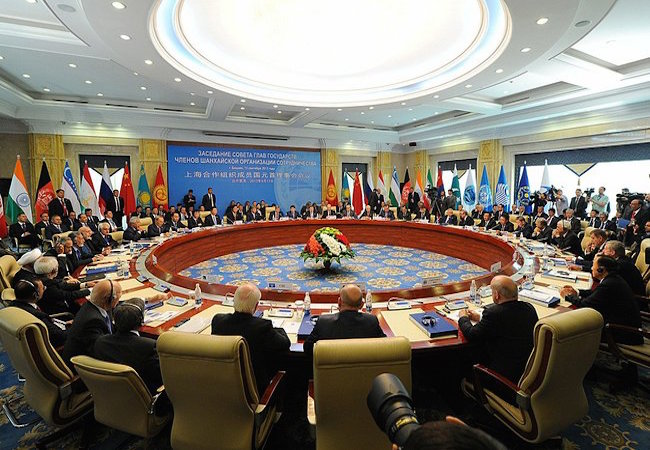
By Qura tul ain Hafeez
Asia is the region which perhaps shares the most dynamic volatile and complex geostrategic environment. The Asian countries by and far have tried to sort out the emerging issues through different channels and platforms. However, the Shanghai Cooperation Organization (SCO) is most successful among them up till now. SCO is primarily the result of joint efforts by Russia and China to maintain peace, security, and stability in the region. Since its beginning in 1990, the organization is successfully promoting regional peace and connectivity for almost past two decades. Being an international organization, the SCO now successfully brags eight permanent members including Kazakhstan, China, Kyrgyzstan, Russia, Uzbekistan, Tajikistan, India and Pakistan. It has four observer states including Mongolia, Afghanistan, Belarus and Iran while Azerbaijan, Armenia, Cambodia, Nepal, Turkey, and Sri Lanka are the dialogue partners.
One of the prime objectives of the SCO is to deal with the three evils of extremism, separatism and terrorism, which are prevalent in the Central Asian countries, and primarily inside Afghanistan. However, with the new emerging strategic trends now Russia is focusing on prevailing security issues and energy potentials. Simultaneously, China on the other hand emphasizes more on regional bonding and economic integration. China, the actual driving force behind the SCO is absorbed with the vision of encouraging regional trade and investment through economic collaborations, and through trade ventures like (BRI, BRICS). This will empower China as an influential and prominent actor in the international politics. The recent 2018 Summit of the SCO on June 9-10, 2018 at Qingdao not only marked the 18thannual anniversary of the SCO but showed the SCO progress with accession of Pakistan and India. Including them as full members to the SCO has widened the SCO’s expansion space. It will stretch it as a broader platform so that it can play its part effectively and in a more influential manner. Keeping always in mind its original aspirations i.e. the “Shanghai Spirit”, the SCO is moving ahead productively.
One of the prominent features of the SCO which binds the members’ states together is the factor of countering the Western influence. The recent G7 summit and presidents Trump’s lashing tweets against Canadian Prime Minister Justin Trudeau clearly show that the Western directive is breaching and an Eastern order is consolidating now. Still there is a need to do allots currently the Asian region is confronting multiple challenges. One of them is the clash of interests as India, Pakistan, China and Russia claim their varying interests in Afghanistan. Moreover, there are certain territorial disputes which lingered on since long and are waiting for attention. These need to be resolved. Owing to its special focus on Afghanistan, the SCO being a multilateral platform (comprehensively deals with the radicalization challenges) is a good option to raise voices. However, due to the presence of NATO and US led coalition forces, there is a little opportunity for the SCO to deal with these transformational changes. Yet in its own capacity, the SCO has an Afghan Action Plan for the SCO members and Afghan government to emphasize upon the joint military exercises, cooperation among the members to combat drug trafficking, terrorism, and organized crimes.
Substantively being the next door neighbor to Afghanistan and sharing the border, Pakistan is very much prone to these challenges. However at the same time placing itself at the crossroad of east and central Asia, it can provide many advantages to the landlocked states of Central Asia and Afghanistan. Utilizing Pakistan’s geostrategic significance, China-Pakistan Economic Corridor, and the Gwadar port, Pakistan can become a source of energy provision and trade hub for the SCO members. In the recent SCO Summit 2018, President Mamnoon Husain stated that “there is a need for building trust for the achievement of durable peace and regional stability in the ’Shanghai spirit of shared development and prosperity’. Moreover, he stressed upon the economic activities to be carried out to enhance the trade. All these efforts show that the SCO is ensuring regional security and economic interests of the Asian region.




